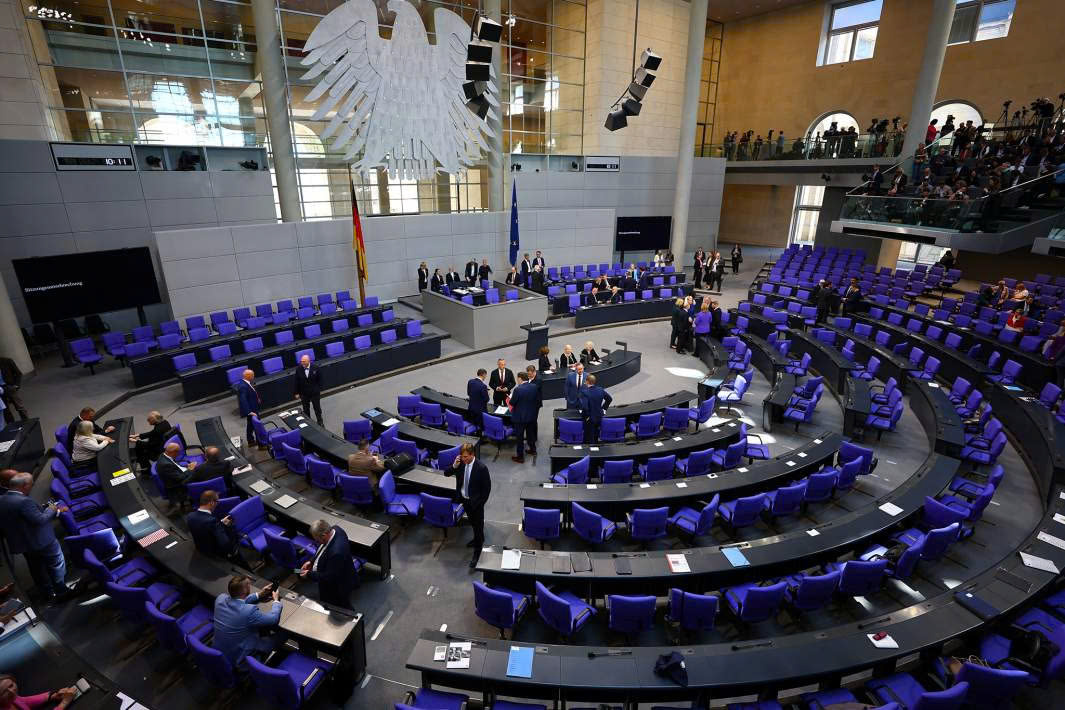Faith shaken from the start
During the two months following the election, the parties to the future coalition – the CDU/CSU and the SPD – worked hard to finalize the coalition agreement document. The document was finally signed by the leaders of the three parties on 5 May, marking an important milestone in the formation of the new government. On the same day, a solemn military band ceremony was held in Berlin to pay tribute to outgoing Chancellor Olaf Scholz. No one expected that, just 12 hours later, faith in a smooth transfer of power would be severely tested.
On the morning of May 6, the Bundestag convened to vote for a new Chancellor. The event attracted special attention because of the presence of many prominent figures, including former Chancellor Angela Merkel. However, in what was supposed to be the beginning of the new government , Germany witnessed a shocking result: Friedrich Merz was not elected Chancellor.
According to the rules, a candidate can only win the election if he wins at least 316 votes - an absolute majority of the 630 MPs. With 328 seats in hand, the CDU/CSU-SPD alliance was considered to have won. But in reality, only 310 votes were cast for Friedrich Merz, meaning that at least 18 MPs in the alliance turned their backs on the candidate they officially supported.
This is not just a technical failure, but a serious warning about the lack of consensus within the newly signed coalition. The fact that a part of the parliament, perhaps for personal or political reasons, or for objections to the way the coalition was formed, chose not to vote for Friedrich Merz shows a deep rift, even though he has just officially entered the ruling period.
There is no precedent for such a situation in German political history. The famously stable parliamentary system is facing a serious test, forcing leaders to think carefully about their next move: a second vote, or Germany falling back into negotiations, or even re-election.
Friedrich Merz’s surprise defeat in the Bundestag election for chancellor was not a simple political accident. Behind the 310 votes, six votes short of the absolute majority that the CDU/CSU-SPD coalition was expected to achieve, there were a series of deep-seated reasons that reflected internal divisions and unhealed political wounds within the Social Democratic Party (SPD), the key partner in the coalition.
First, a major factor was opposition from the SPD’s left wing, which had always been wary of working with the conservatives. The coalition agreement did not please them by proposing reforms to the Bürgergeld, the basic social welfare system that was a hallmark of Olaf Scholz’s presidency. Raising the minimum wage, a core socialist policy, was listed as an “achievable” goal, with no firm commitment. Furthermore, the document made no mention of a tax on big business, a long-standing demand of the SPD for a more equitable redistribution.
Second, sign political resentment and suspicion towards Friedrich Merz. Many SPD members still have not forgotten the days when Friedrich Merz led the opposition, with his politically charged and manipulative attacks on the Scholz government. This confrontation left an indelible impression, especially among MPs loyal to the former Chancellor.
Tuesday, Another major rift is the disagreement over immigration policy. The SPD vehemently opposed a populist migration bill proposed by the CDU/CSU and put to a vote in January 2025. Although the bill was rejected, it was shocking that it received support from the far-right AfD, the first time a proposal from the traditional parties had been put to the Bundestag. This sparked massive protests across Germany, with some 700,000 people taking to the streets, protesting against the possibility of “situational cooperation” between the conservatives and the far-right. For the SPD, this was a red line, and any cooperation with Friedrich Merz was viewed with suspicion.
Fourth, the “debt brake” and the controversial policy pivot. Immediately after the February election, Friedrich Merz disappointed many conservative voters by breaking his campaign pledge not to relax the “debt brake” (Schuldenbremse) rule. Instead, the Bundestag quickly passed a reform of the rule in March with the support of the CDU/CSU, the SPD, and the Greens—a move that was criticized as pragmatic and against long-standing conservative fiscal principles.
Fifth, unfamiliar faces and a cabinet lacking identity. Another factor that undermines confidence in the coalition is the composition of the CDU’s proposed cabinet. Apart from Friedrich Merz and Patrick Schnieder (the candidate for Chancellor’s Chief of Staff), all the other faces are unfamiliar to the public. Three are not Bundestag members, and there are representatives from lobbying organizations and the business community – which raises concerns about the influence of vested interests. There is no representation of the radical wing of the CDU, nor is there any trace of the “Merkel school”, which used to represent a more moderate and moderate conservative trend.
Friedrich Merz wins after second round of voting: A close and binding victory
According to the Basic Law of the Federal Republic of Germany, if a candidate for Chancellor does not win an absolute majority (at least 316 out of 630 members) in the first round of voting in the Bundestag, the Bundestag has up to 14 days to hold further rounds of voting. During this period, any member of parliament can run for office. If no one still wins an absolute majority, the Bundestag immediately conducts a third round of voting. In this round, if a candidate wins an absolute majority, he or she will officially become Chancellor. However, if only a relative majority is achieved, the decision will be made by the Federal President, who can choose between appointing the Chancellor or dissolving the Bundestag and holding new elections.
Under pressure from the prospect of political instability and the risk of an early election disrupting the entire situation, a second round of voting was held just hours after the first round failed - a decision that showed the urgency within the coalition. The result: Friedrich Merz won 325 votes, more than the required number, and officially became German Chancellor. However, three deputies in the ruling coalition continued to abstain from voting for him, a clear sign that the dissatisfaction had not been completely resolved.
The rapid success in the second round of voting can be explained by two main factors: First, there is no viable alternative candidate that can be convincing in the short term. Second, a new election to the Bundestag is not only expensive and risky, but also threatens the position of the major parties in the coalition. In a context of deeply polarized German politics, no one wants to take any more risks.
However, the victory of the new Chancellor Friedrich Merz does not mean a smooth road. To maintain his position, he will have to face pressure from both sides: the wariness of the SPD, and the growing demands of the radical wing of his own CDU party - which is not satisfied with the composition of the cabinet with a traditional technocratic and conservative leaning.
Friedrich Merz, who once declared that “politics is not as complicated as it seems,” is now learning that in a multiparty parliamentary system like Germany’s, complexity is the order of the day. The checks and balances on power come not only from the opposition, but also from within his own coalition and party.
Hung Anh (Contributor)
Source: https://baothanhhoa.vn/berlin-chao-dao-tan-thu-tuong-friedrich-merz-mot-chien-thang-khong-tron-ven-247916.htm





































































































Comment (0)